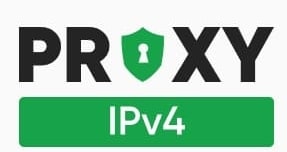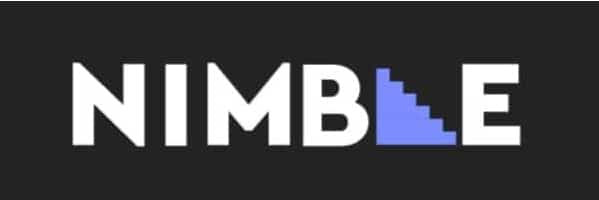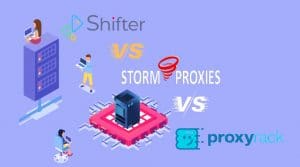Looking forward to learning more about SSL Proxies? Hop in now, and read our article on guide to SSL Proxy. You’ll be learning a lot, ranging from what they are to recommendations that cut across the datacenter and residential proxy categories.
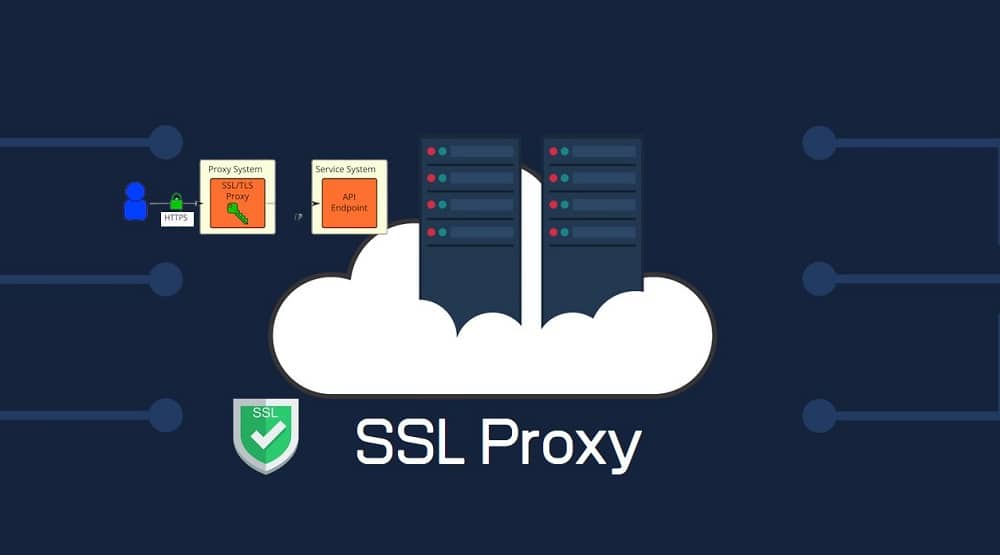
Are you a newbie in the world of SSL Proxy? After reading this article from start to finish, your knowledge about the subject will increase. Based on the HTTP protocol, we have basically two types of proxies; these include the HTTP and HTTPS proxies.
HTTPS proxies are what many professionals call SSL Proxies. The focus of this article will be on SSL Proxy. However, a little about HTTP proxies will also be discussed. Aside from discussing what SSL Proxies are, you are going to be learning the difference between HTTP and HTTPS proxies. The article will end will recommendations for SSL Proxies.
What is an SSL Proxy?
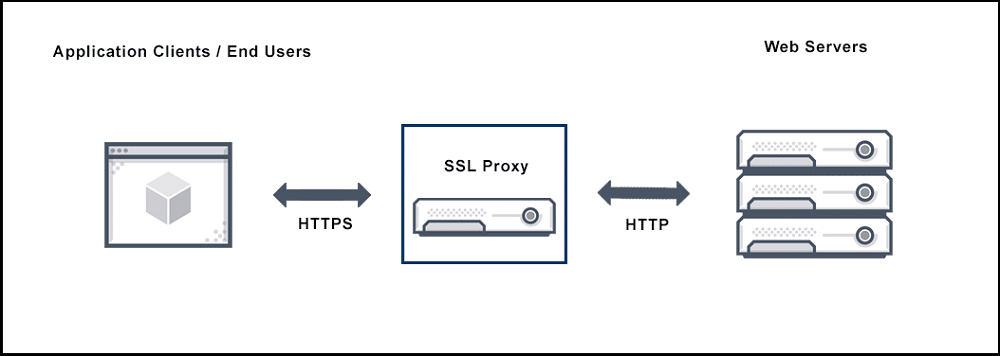
As stated earlier, an SSL Proxy is an HTTPS Proxy. Just like any other type of proxy, this proxy serves as an intermediary between a client’s computer and web servers on the Internet.
If you are using an SSL Proxy, requests you send to websites do not go to the websites directly – they are being routed through the SSL Proxy for modification in other to modify your request header to strip out your IP Address and replace it with a different one. What makes it different from other proxies is that it is secure, thanks to the SSL support. You can call an SSL Proxy and HTTP proxy with SSL support because that’s what it is.

How SSL Proxies Work
When Using an SSL Proxy, only one TCP connection is created. Unlike in the case of HTTP proxies that creates two connections – one from client to proxy, the other from proxy to web server, an SSL Proxy setup will create only one TCP connection. How it does this is simple.
When you initiate a web request, it sends a CONNECT request to the web server and creates a TCP channel where your request is channeled through. With this, they do not need to look at the data bundled together with your request – their only interest is with your IP Address, and that can be gotten from the header of your request. This makes them more secure than HTTP proxies.
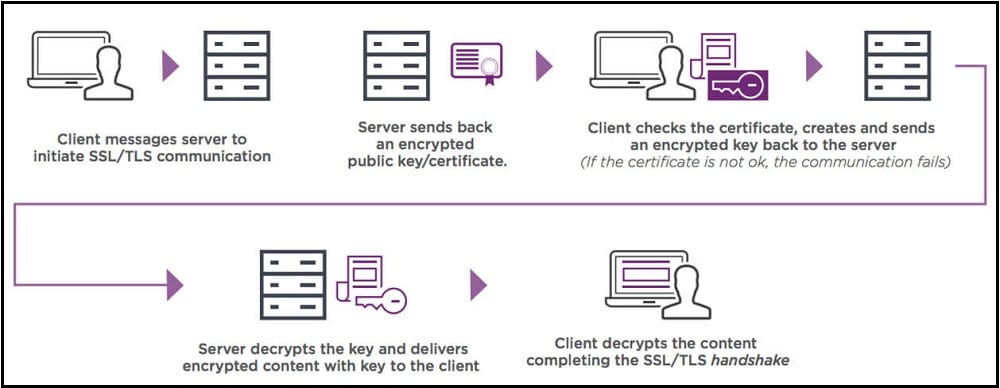
One advantage of SSL Proxies over HTTP proxies is that they can be used for accessing resources from both HTTPS and HTTP servers. This is not something you can do with HTTP proxies that can only be used to access resources from HTTP websites. If you try to access an HTTPS site using an HTTP proxy, your connection to the website will not be secure.
HTTP Vs. HTTPS Proxies
Many Internet users are already aware that HTTPS is the secure version of HTTP. But in the context of a web proxy, how do they differ? And which is better?
Well, the major difference between the two types of proxies is the way they connect you to the web server you are requesting resources from. From the above, you can see that HTTP proxies, create two TCP connections and will have to access your request data to see where you are going to – and this is what makes it not secure.
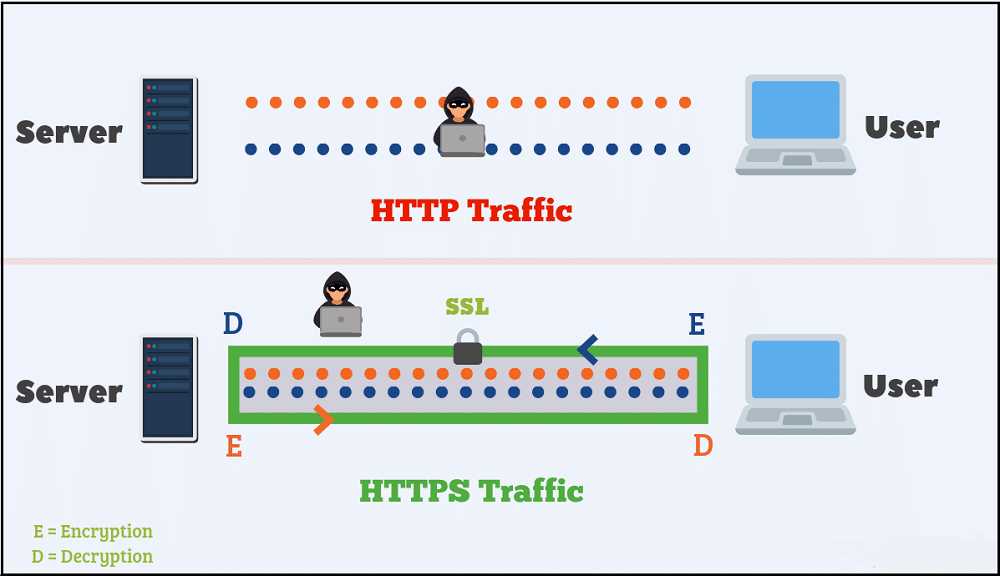
For HTTPS proxies, instead of creating two TCP connections, they create only one. When you send a request through them, a TCP connection channel is created where your request can pass through to the web server you originally want to visit. HTTPS proxies do not read your request data; they only read the header and replace your IP Address with a new one.
What are the Benefits of HTTPS Proxies?
There are two major advantages HTTPS proxies have over HTTP proxies. These include security and versatility in the area of application. Because of its SSL feature, you get to enjoy an encrypted connection that makes it difficult for eavesdroppers to understand the content of your web request body – the fact that they do not also look at the request body makes it even more secure. There’s also the benefit of being able to use it to access HTTP websites. These two benefits cannot be gotten from HTTP proxies.
Free SSL proxies List
Now that you have a clearer picture of what SSL Proxies are, and you can easily find out a lot of websites that offer free SSL proxies online,
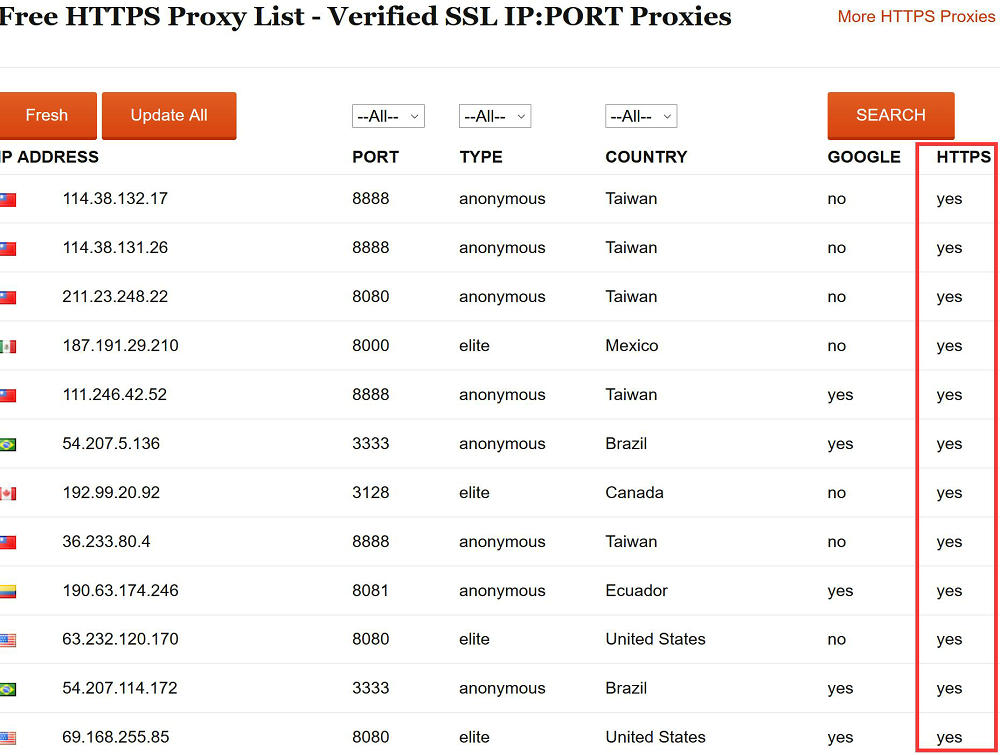
- https://hidemy.name/en/proxy-list/?type=s#list
- http://spys.one/en/https-ssl-proxy/
- https://sslproxies.org
- https://www.proxyfish.com/proxylist/all_https_proxies.php
- https://www.proxy-list.download/HTTPS
- https://list.proxylistplus.com/SSL-Proxy
- http://www.idcloak.com/proxylist/ssl-proxy-list.html
Before that, it is important I state here that on no account should you use a public or free SSL Proxies as they cannot be trusted! Why? Those public proxies are not just slow for everyone can access the proxy, but also not safe to use.
Avoid proxies from sites like sslproxies.org like a plague or do not use them for anything serious, So Let move straight into discussing the best HTTPS/SSL Proxies you can get in the market.
Best SSL Proxies – Where to Buy SSL Proxies?
SSL Datacenter IP Proxies
There are a good number of proxy providers with SSL support. However, when it comes to the recommendation, you can only recommend the best out of the list available. I am going to be discussing the top 3 HTTPS datacenter proxy providers in this category.
MyPrivateProxy

- Locations: US and EU region only
- Concurrency Allowed: Up to 100 threads
- Bandwidth Allowed: Unlimited
- Cost: $1.49 per proxy for a month
When it comes to the provision of datacenter proxies, MyPrivateProxy is king – it is arguably the best datacenter proxy provider in the market. The proxies are SSL Proxies, and as such, you can use them together on all websites since they support both the HTTP and HTTPS protocol.
From MyPrivateProxy, you can buy both shared proxies and private proxies from them. But I do not advise readers of our blog to use shared proxies. Their pricing can be said to be friendly even though they are not the cheapest in the market. When it comes to location coverage, they have got the US and EU covered.
Proxy-IPv4
- Locations: 30+ countries
- Concurrency Allowed: Unlimited
- Bandwidth Allowed: Unlimited
- Cost: $0.4 per proxy for 3 days
Proxy-IPv4 offers specialized private datacenter proxies, including IPv4 and IPv6, with a flexible pricing model starting at $0.40 per proxy. This affordability, combined with discounts for bulk orders and extended rentals, makes it suitable for various users.
The service's extensive network, encompassing over 150 networks and 200 subnets globally, allows precise geo-targeted operations, catering to diverse project needs. Additionally, Proxy-IPv4 ensures high uptime and rapid response times, essential for consistent and reliable online activities.
InstantProxies

- Locations: Worldwide
- Concurrency Allowed: Unlimited
- Bandwidth Allowed: Unlimited
- Cost: $1.00 per proxy for a month
InstantProxies is the proxy for the low budget Internet marketers. This is because it is cheap and gets the job done. A proxy costs $1, and their smallest package comes with 10 proxies making it cost $10.
One thing I like about InstantProxies is that proxies are tested to ascertain their functionality before sold to customers. However, this does not in any way rule out the ability to ask for a refund if they do not work for you within 5 days after purchase.
SSLPrivateProxy

- Locations:North America and Europe
- Concurrency Allowed: Unlimited
- Bandwidth Allowed: Unlimited
- Cost: $1.76 per proxy for a month
From the name of this provider, you can tell their proxies are SSL proxies, and as such, you are protected. They make use of state of the art technologies to provide you the best reliability possible.
When it comes to location coverage, they have got proxy servers in 34 North America, distributed in the United States and Canada. Aside from this network, they also have a network of 5 proxy locations in Europe. While their service can be said to be top-notch, the pricing is slightly not friendly, especially their special packages like their classified ads proxies and Instagram proxies.
SSL Residential Proxies
Residential proxy is different from datacenter proxy in the sense that the IP Address they use are issued by Internet Service providers and, as such, are more trusted by websites. Below are the top 10 residential proxy providers with SSL Proxies.
Bright Data
- IP Pool Size: Over 72 million
- Locations: All countries in the world
- Concurrency Allowed: Unlimited
- Bandwidth Allowed: Starts at 40GB
- Cost: Starts at $500 monthly for 40GB
If you have been researching about proxies for a while now, my guess is, you must have come across Bright Data. It is the largest proxy network in the world, with over 72 million residential proxies, 7 million mobile proxies, and over 750 thousand datacenter proxies.
If you are looking for a residential proxy with a good session control, Bright Data is the way to go. Bright Data currently has proxies in all countries in the world and in major cities around the world. Their proxies are fast, secure, and reliable. The major problem with Bright Data is its pricing, which is considered not friendly for small marketers.
Smartproxy
- IP Pool Size: Over 40 million
- Locations: 195 locations across the globe
- Concurrency Allowed: Unlimited
- Bandwidth Allowed: Starts at 8GB
- Cost: Starts at $80 monthly for 8GB
I stated above that Bright Data is expensive. If you are looking for a cheaper alternative Bright Data, I will advise you to check out Smartproxy. They are both priced based on bandwidth, and the price per bandwidth is almost the same.
However, the minimum monetary commitment for Smartproxyis $80, as opposed to Bright Data’s $500. It has good location coverage, too, as it has proxies in about 195 countries and in 8 major cities around the world.
Nimbleway
- IP Pool Size: Undisclosed
- Locations: All countries supported
- Concurrency Allowed: Unlimited
- Bandwidth Allowed: Starts from 75GB
- Cost: Starts from $600 monthly for 75GB
The Nimble residential proxy network is a new provider, but it is already making waves, having the likes of Uber and Pinterest on its customer list. It is one of the providers that support HTTPS protocols, making it a good fit on this list. It is an enterprise-level provider that offers modern residential proxies powered by AI and machine learning to ensure effectiveness.
First, this network has millions of IP addresses in its pool. It is from this pool it assigns IPs to you — but the assignment is not random. It uses an AI system to determine the best IP address for your target in other to avoid blocking.
One thing you will come to like about this provider is its performance, as it is one of the fastest residential proxies. It scales well, too, and has one of the most extensive location support in the market. However, its pricing can be expensive as it starts from $600 for 75GB monthly.
Stormproxies
- IP Pool Size: 40,000
- Locations: the US and EU region only
- Concurrency Allowed: Starts at 40 threads
- Cost: Starts at $50 monthly for 5 ports
Stormproxies is the last on our list in the residential proxy category. Their proxies are compatible with both HTTP and HTTPS protocol. One thing that makes me like Stormproxiesbackconnect proxy is that their proxies are unlimited proxies.
Their proxies are not unmetered, and as such, you can enjoy unlimited bandwidth – with a restriction on the number of concurrent connections you can create. They also have some of the most specialized proxy packages ranging from sneaker copping proxies to Pokemon Go proxies to proxies for scalping tickets.
NetNut
- IP Pool Size: 52M+ Residential IPs
- Locations: Global
- Concurrency Allowed: Unlimited
- Cost: Starting at $350 monthly for 20 GB
NetNut offers residential SSL proxy services that enable users to mask their IP addresses and access the internet through a network of residential IP addresses. This type of service is used for various purposes, such as accessing geo-restricted content, testing websites from specific locations, data mining, and more.
Currently, NetNut boasts one of the largest proxy networks globally, with over 52 million IPs worldwide. This includes over 1 million static residential IPs, 1 million mobile IPs, and 150,000 datacenter IPs.
If you're looking for a residential proxy with robust session control, NetNut is your ultimate ally. As previously highlighted, NetNut's global coverage allows you to access localized content from any location seamlessly.
Another important aspect is that NetNut's residential proxy servers are fast, reliable, and efficient. In terms of pricing, this provider offers plans tailored to the requested bandwidth. You can acquire 20GB of bandwidth starting at $300 per month.
FAQs
Are SSL Proxies Anonymous?
Not all SSL Proxies are anonymous. The level of anonymity differs, depending on the provider. However, I can confirm to you that the providers discussed above are 100 percent anonymous.
Are SSL Proxies Secure?
SSL Proxies are HTTPS proxies. HTTPS Proxies are the secure version of HTTP Proxies. This security is because of the SSL support attached to it. However, the security of free and public SSL Proxy cannot be guaranteed.
Which SSL Proxy Should I use – Datacenter or Residential?
The answer to this question depends largely on why you need a proxy and the site you intend to use proxies on. If you intend to use proxies on complex websites such as Google, Instagram, and YouTube, residential proxies are the proxy of choice. Some complex websites such as Twitter and Facebook have relaxed systems that datacenter proxies can still work.
Conclusion
SSL Proxies, otherwise known as HTTPS Proxies, brings security to the proxy world. With them, you are sure of a secure encrypted connection. However, you have to avoid using the ones given out for free. The providers discussed above have some of the best SSL Proxies in the market – some of them are quite cheap. Make a choice today.

